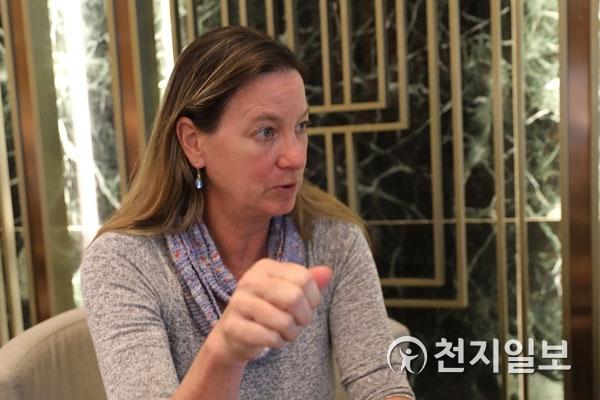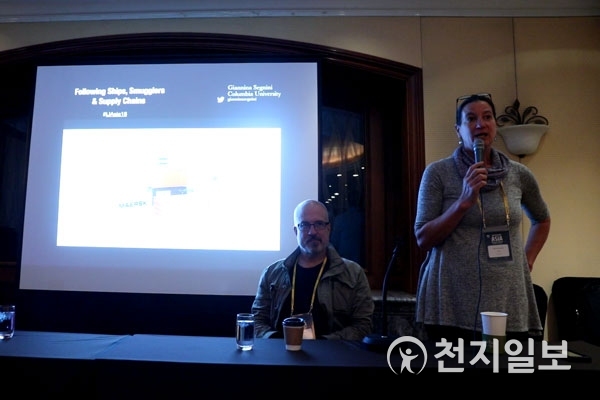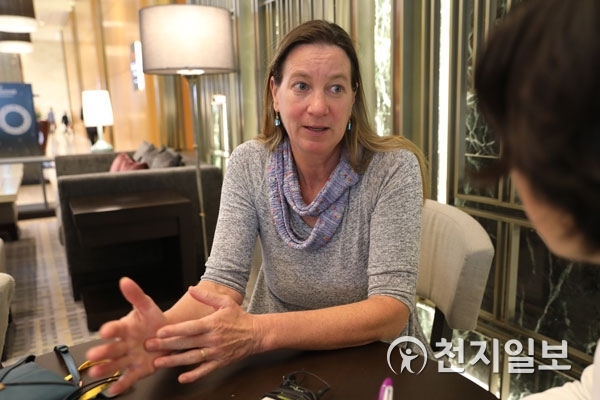
Two- Time Pulitzer Prize Winner
For Humanitarian Work by Bringing to Light the No Gun Ri Massacre and
Slavery in Southeast Asia with the Power of the Pen
[Cheonji-Daily News=Song Tae-Bok, Hwang Si-Yeon] The "No Gun Ri Massacre is a war crime the U.S. and has committed and made us realize the cruelty of war." Martha Mendoza, an Associated Press (AP) journalist who informed the world of the massacre of civilians in No Gun Ri, remarked as she recalled covering the story.
I met Martha Mendoza at a hotel lobby in Seoul, South Korea on October 5th. She was invited to the The Third Asian Invitational Journalism Conference hosted by the Korea’s Exploration and Journalism Center and Newstapa.
The No Gun Ri incident occurred between July 25-29 in 1950. The U.S. military fired machine guns at Korean citizens who were fleeing along the Gyeongbu line, killing more than 300 people. It was shocking to learn that the U.S. military fired indiscriminately at people seeking refuge under bridge for three nights and four days.
As the catalyst Martha Mendoza along with her colleagues Sang-hoon Choi and Charles Henry dug into the real story. Through an article titled, "No Gun Ri Bridge" she revealed the truth to the world about the massacre in September 1999 and was awarded the Pulitzer Prize.
Sang-hoon Choi told me about the No Gun Ri incident and premised it the fact that the goal was to uncover the truth.
This AP team, revealed the truth by interviewing the U.S. Department of Defense and U.S. soldiers who were discharged from the military. A former soldier of the first U.S. cavalry said, "They are enemies over the U.S. line, so shoot them. Women and children are left to discretion," he was later realized he participated in a crime by killing people who were actually were refugees, rather than enemies in No Gun Ri.
"The U.S. military wrote a daily diary during the Korean War, and the records of the period of the Nogun-ri incident were missing," Mendoza said. The massacre, which was likely to escalate into a diplomatic issue between the two countries, was not accurately reported.
"After learning that the No Gun Ri incident was a "military war crime," Mendoza said, "I had a big conflict over whether to report anything disadvantageous to my country." "Although I had a lot of conflicts, I decided to report the truth for the victims," she recalled.
U.S. President Bill Clinton made a statement of regret when the incident was revealed after the story broke. Since then, a joint investigation was conducted between the two countries and a 132,200-square meter Peace Park was created near the site of the massacre in 2011. Clinton even visited No Gun Ri to pay tribute to his victims last year.

◆2nd Pulitzer Prize
Mendoza participated in the four-member AP Exploration Team. The team deals with the slave labor market in Southeast Asia. Her journalistic contributions led to winning yet another, Pulitzer Prize. The Public Service Award is considered the most prestigious media award.
The report revealed the process by which Southeast Asian seafood is brought to U.S. tables. They outlined the labor and distribution processes. Since the report, 2000 slave laborers have been rescued. Pictures of fishermen trapped in bars and living in miserable conditions were appalling. Some of the victims were trapped for over 20 years.
At that time, the AP team worked for the safety and freedom of those enslaved. It took over a year to break the story and resulted in all the 2,000 people being rescued. The report is considered one of the greatest public service stories.

Through the interview with Mendoza, I was able to uncover the secret of winning the Pulitzer Prize twice. She never went against the reporters' conscience to help the weak, the unjust, and faceless and worked as a team to bring about change.
It didn't take long for me to feel the sincerity and warm from a Mendoza. Mendoza is still in the field as a strong influence in investigative reporting.
She is a mentor who reminds me of how influential the pen is in improving the world and how noble and rewarding a reporter’s career can be. The short interview left me with a lasting impression.

